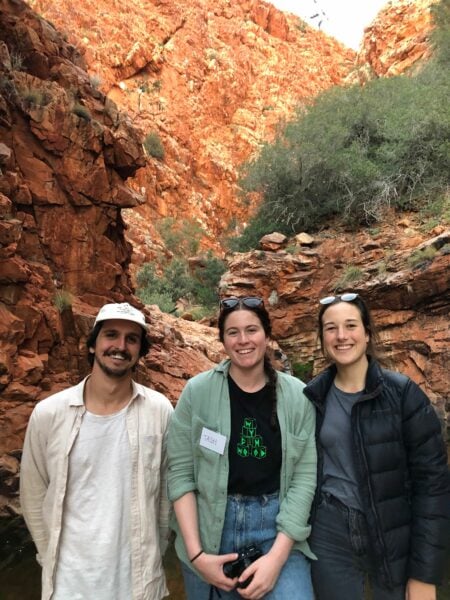REFLECTION: Architecture students join remote NT HfH project
Students join Housing for Health projects across communities in the NT in 2023

The students (L-R: Toby, Tash & Kate) were privileged to visit a local waterhole with the company of a local Traditional Owner
Offered as as an elective again this year, students from the University of Newcastle’s School of Architecture, had the opportunity to join an HfH project team as a Team Assist during Survey-Fix 1 ,in a remote NT community. They worked alongside community members to survey and fix community housing. This elective was similar to the one offered in 2022 for students to join the Alice Springs town camp MHBH project.
Three students, Toby, Tash, and Kate, recently joined a project and worked incredibly hard in all project areas, which we are very grateful for. They have shared their reflections of the experience for us to share –
“It seemed to us, the meeting of systemic disadvantage and increasing temperatures due to climate change is resulting in poor building functionality and unsatisfactory built outcomes. Heat-related illnesses are exacerbated by building designs that are not suitable for arid climates.
Under Healthabitat’s processes, we are grateful that the local people graciously allowed us into their community and homes to undertake works that actually make a difference, both in the short and long term.
Although the community showed us great generosity, it became clear to us that these communities are still experiencing the dynamic, long-lasting effects of unsolicited colonial actions and decisions. The urgency of advocacy and data-driven action in remote indigenous communities became clear to us over the week.
It was a wonderful experience to work alongside Heathabitat and community members, allowing us to develop relationships with each of them. The Housing for Health model is an effective and satisfying way to work as we were able to immediately see the trades rectifying hardware failures in the houses that had been identified by our teams. This process tries to limit things getting lost in translation with results starting to show while you are still in the community.
As architecture students this experience highlighted the importance of listening and forming connections with community members. By understanding the real problems faced by the indigenous communities, architects can work with communities to create meaningful solutions and raise awareness around housing-related issues. “
We think it is important for built environment professionals to engage in such work, especially at a student level. As Dr Jasper Ludewig explains – “As climate change continues to destabilise who gets to live where and on what terms, architects must understand how their particular skillset—and the labour that sits behind it—can meaningfully assist communities in resisting the broader forces of uneven development.”









